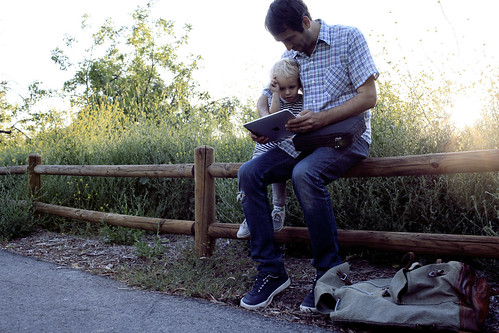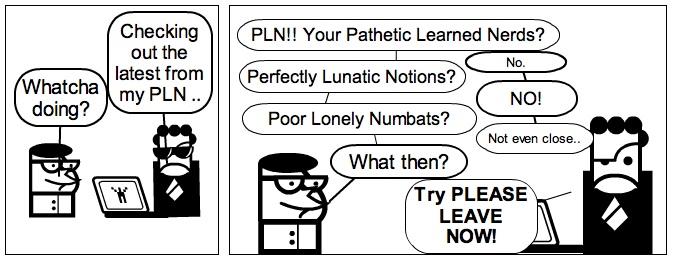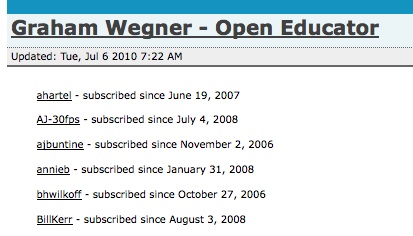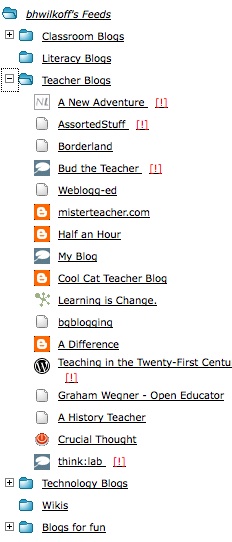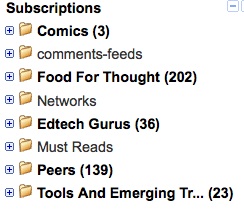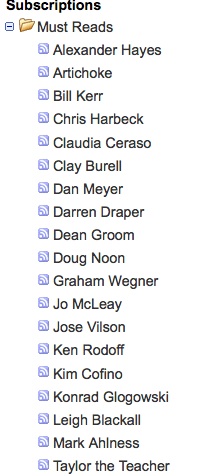I'm a bit weak when it comes to putting forward an opinion or wading into a debate. I get easily intimidated by people who speak and write with high levels of self-assurance and it is easier to be the fence sitter. That's OK - there are plenty of lurkers all over the internet who benefit from other people's bravado and expertise in equal measures but in my case recently I dropped a hint and let others pitch into the issue. Confused? Let me explain.
The other week I posted about my views on the PLN acronym and received a comment and link from Lisa Neilsen over at the Innovative Educator. I had never crossed with her before and was pleasantly surprised to discover her work showing me that there are plenty of edubloggers out there with many times the subscribers I have that I'm not aware of. I could launch back into the PLN / Networked Learning semantics that I subjected Lisa to in her comments section but that's not my point here. After my awareness was raised I subscribed to her blog and a few days read her post Why I Hate Interactive Whiteboards Too.
Regular readers here will know that I've written a reasonable number of angsty posts on this designed-for-education technology over the past few years, and that posts like this are impossible for me to ignore. I'm like a swinging voter in an election on this issue. Reading Lisa's post sent my brain back to my personally disappointing experiences at the National IWB Conference last year, and conjured up a mental image of having someone like her with her passion and persuasive skills square off with her tech tools against a skilled and equally passionate IWB advocate. In my head, Chris Betcher came to mind. A duo duelling double keynote would be a gutsy alternative to someone just blindly pontificating the wonders of the IWB - but I wasn't the one with any guts to put this idea out here on my blog. So I slyly expunged the idea from my brain out on Twitter with this tweet, thinking that no one would care or even notice it.
But once you release even something as small as that onto the web, it takes on its own life, able to be picked up and re-shaped into whatever the next reader wants. So Peter Kent, probably one of the foremost experts on IWB pedagogy in Australia, picked up my tweet and decided it was worth his while wading into Lisa's territory and engaging in a professional conversation which he has now described as: Just posted a outline of what is the best #IWB debate I have been involved with http://tiny.cc/3sjed
I have a lot of respect for Peter and his groundbreaking work at Richardson Primary. He has graciously travelled to Adelaide to speak to our staff when we started our IWB program and always been willing to engage in dialogue with me online as well. So, while I felt that Lisa's post were excellent and made a lot of sense, I am glad that Peter chose (in his own tweeted words) to put his head into the lion's mouth and add a series of well written comments in response to Lisa's posts. It makes for an interesting pathway through Lisa's posts - Why I Hate Interactive Whiteboards Too, IWBs are Not the Stars. They’re the Overpaid Extras with A Great Agent, Getting Smart about the Real No’s No’s of Teaching with IWBs - A Photo Compilation and Got Money for a Really Expensive Set of Training Wheels? I’ve Got An IWB to Sell Ya. Peter's comments are in various spots but he posts in his own space on the The Interactive Whiteboard Revolution Ning - The IWB debate - where do you stand?
What I really like about Peter's responses (and I suspect that Lisa likes it too) is how he draws things back to defining high quality teaching and how unless you have that in a classroom then it doesn't matter what the tech debate does. Whether you like it or not, the way we have schools set up at present, what happens in the classroom is dictated by the teacher. Even if the students are all involved in self directed learning with a great deal of choice, that has been enabled by the teacher in charge of that classroom. The same goes for the use of technology within that classroom as well - if the teacher cannot easily bend the technology to achieve learning outcomes that he or she has identified as being crucial for his or her students, then they are hardly likely use it, are they?
So, in some ways, I got my intellectual showdown but in some ways, this interaction between two high level educators is a better deal online than it would be in the confines of a conference. I laid out some virtual breadcrumbs and it snowballed. I've learnt a heap from both Peter and Lisa.
Thank you, both of you. I think I owe you both a few well thought comments back on your pieces of cyber-turf - when I finally decide what my actual position is. But hey, the beauty of networked learning is that I don't ever need to come to a final conclusion on an issue as my views can continually morph as new factors and counter viewpoints are aired across social media platforms.

